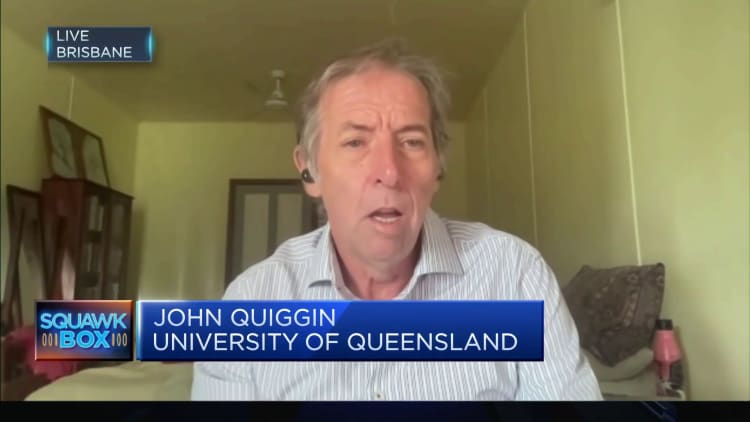With just days to go before the Philippine elections, Ferdinand Marcos Jr. continues to retain a big lead over his closest rival — the country's current Vice President Leni Robredo.
That's according to the latest survey by independent pollster Pulse Asia which found that 56% of respondents favored Marcos, the son and namesake of late dictator Ferdinand Marcos who was overthrown in 1986.
Robredo, who defeated Marcos in the vice presidential bid in 2016, remained a distant second. She garnered 23% in the opinion polls which surveyed 2,400 people between April 16 to 21.
"There are many candidates, only two have any chance of winning: Ferdinand Marcos Jr., son of the Philippines' longtime former dictator, and current Vice President Leni Robredo," said Joshua Kurlantzick, senior fellow for Southeast Asia at the Council on Foreign Relations, an American think-tank.
Outgoing President Rodrigo Duterte, whose six-year term ends in late June, has not endorsed any of the presidential candidates — but his political party is backing Marcos, according to Reuters.
Even though Duterte's approval ratings remain high at 67%, he can only serve for one term under constitutional law.
There are some 67.5 million voters who have registered for the May 9 election. In addition to voting for senators as well as provincial, city and municipal officials, Filipinos will also be electing a president and a vice president, who will each serve for the next six years.
Voting is set to close at 7 p.m. local time on Monday, with counting set to start after that. Unofficial results might be released as soon as a few hours via a live vote count, according to Reuters. However, during the presidential elections in 2016, Duterte was officially proclaimed the winner only three weeks after the polls.
The other eight candidates include world boxing champion Manny Pacquiao who received the next highest support of 7% in the survey, and Manila mayor Francisco Domagoso — a former actor better known by his stage name Isko Moreno — who garnered 4% in the opinion polls.
China-Philippines relations
"On foreign policy, China remains the biggest issue," said Kurlantzick of the Council on Foreign Relations in an April 21 note.
The top two candidates in this election appear to have differing views on China.
Beijing's enormous unpopularity in the Philippines could limit Marcos Jr.'s ability to work closely with China...Joshua KurlantzickCouncil on Foreign Relations
Among the top contenders, Marcos is seen as the most China-friendly candidate. If elected, Marcos could continue Duterte's pro-China policies, something he has engaged in since his election in 2016.
However, sentiment within Duterte's own government appears to have deviated and anti-China rhetoric may be growing louder. Analysts says this could push the next president to shift away from Duterte's China-pivot.
"Marcos Jr. has historically enjoyed a warm relationship with Beijing and could want to woo China again, as well as attempt to launch more Beijing-backed infrastructure projects. But Beijing's enormous unpopularity in the Philippines could limit Marcos Jr.'s ability to work closely with China," Kurlantzick wrote.
"In contrast, Robredo has promised a tough approach toward Beijing, vowing not to even discuss the South China Sea with Beijing until it recognizes that a 2016 tribunal at the Hague ruled in favor of Manila's claims— something Beijing almost surely will never concede," he added.
One contentious issue in the relationship between China and the Philippines is the 2016 ruling on their territorial dispute over the South China Sea. The international tribunal in the Hague dismissed China's claims to much of the South China Sea and ruled that specific portions claimed by both countries belonged to the Philippines alone. China has rejected that ruling.
But if Marcos tries to shift Manila toward Beijing, it might present a "serious problem" for regional security and U.S. forces, Kurlantzick said adding that the Philippines is central to the U.S. position in the South China Sea and toward Taiwan.
Still, Kurlantzick said that both candidates will likely build closer ties with Washington.
A blow to democracy
"Political dynasties" are dominating the presidential election, with not just Marcos, but also his running mate Sara Duterte, pointed out Sheila S. Coronel, a professor at Columbia Journalism School.
Sara Duterte is the incumbent president's daughter, who is currently a mayor of of the southern city of Davao.

"The rise of the strongmen's children reveals more than their parents' enduring hold on the Philippine political imagination; it reflects the failure of the country's transition to democracy after Marcos's fall," wrote Coronel in a Foreign Affairs article this week.
The elder Marcos has led an era of authoritarianism and corruption, ruling for two decades from 1965 — nearly half of it under martial law. During that time, tens of thousands were either imprisoned, tortured or killed.
Such political dynasties currently "dominate" local government posts and make up as much as two-thirds of the Philippine Congress, the professor said.
"Now they hope to capture the country's two highest offices. Although the elder Marcos is long dead, the struggle between democracy and autocracy in the Philippines is far from over—and the upcoming election could determine the country's path for decades to come," Coronel said.
— Yen Nee Lee contributed to this report.


